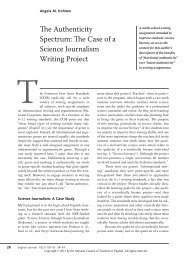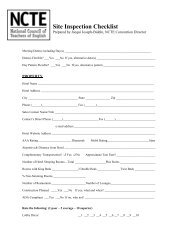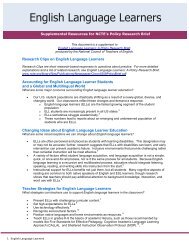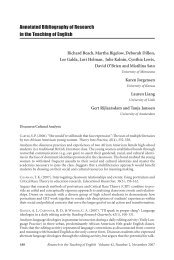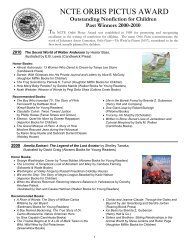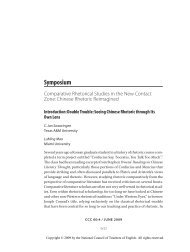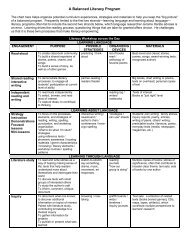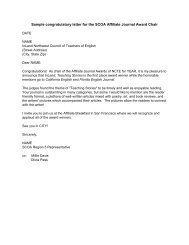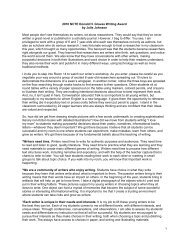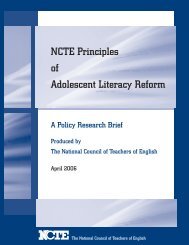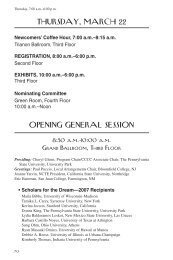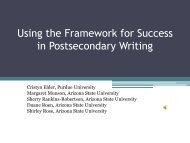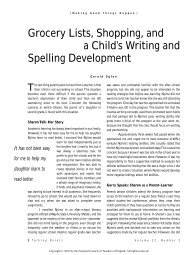1 Float Like a Plane, Sting Like a Bomb: The Ethics of US Drone ...
1 Float Like a Plane, Sting Like a Bomb: The Ethics of US Drone ...
1 Float Like a Plane, Sting Like a Bomb: The Ethics of US Drone ...
You also want an ePaper? Increase the reach of your titles
YUMPU automatically turns print PDFs into web optimized ePapers that Google loves.
<strong>Ethics</strong> for Muhammad Ali was like a third arm, a manifestation donned in ashinning scarlet boxing glove that packed a punch hard enough to force his globalaudience to examine the issues <strong>of</strong> racism and war. Ali stringed up his third glove anddanced every time he opined the structural inequalities <strong>of</strong> racism in America or spoke outabout how the recruitment for wars like Vietnam and, most recently, the “war on terror,”was disproportionately towards minorities and the poor. He fought with his ethics-arm inrings shaped like college campus auditoriums and talk-show television sets, one tightlyclenched fist striking into existence a paradoxically nonviolent opus. However, Ali’s roleas a social, anti-war activist began before he ever stepped inside a boxing ring.In interviews conducted by Thomas Hauser, who at the time was writing hisdefinitive biography <strong>of</strong> Ali that was later published in 1991, Muhammad Ali talked abouthis youth when he still went by his birth name, Cassius Marcellus Clay, Jr. “Mymother…[Odessa Clay]…taught us to love people and treat everybody with kindness.She taught us it was wrong to be prejudiced or hate” (Hauser 14). In a similar interview,patriarch Cassius Clay, Sr. said that he taught his son to “always confront the things youfear, try to be the best at whatever you do” (15). When it comes down to it, Ali’s valuesystem was based on the larger proposition that ethics was something that one shouldhold in high-esteem, that above everything a man’s principles mattered (10). Ali <strong>of</strong>tensaid that he had been blessed with God-given “special resources” and since then he had aresponsibility to use them to do good (18).Studying this list <strong>of</strong> Muhammad Ali’s all-inspiring prolific values, I found myselfjuxtaposing them with that <strong>of</strong> this country’s leaders. For example, I asked myself: ShouldBarack Obama, a man that arguably has “special resources,” not be held to the samestandards? Doesn’t our president have the same responsibility to do the right and ethicalthing? Judging by what transpired at the end <strong>of</strong> his first year as president, if Obama washeld to the same principle <strong>of</strong> doing the right thing as Ali held himself, then you will seethat our president’s values didn’t hold up.On January 19, 2010, Obama and his security <strong>of</strong>ficials attended a weeklycounterterrorism meeting. When presented with images <strong>of</strong> fifteen Yemenis suspected <strong>of</strong>being members <strong>of</strong> Al-Qaeda, Obama “insisted on approving every new name on anexpanding ‘kill list,’ poring over terrorist suspects’ biographies on what one <strong>of</strong>ficial callsthe macabre ‘baseball cards’ <strong>of</strong> an unconventional war.” In other words, he wanted to bethe one that decided who would be targeted and killed by drone attacks, a decision theNew York Times called the “final moral calculation” (Becker and Shane). Perhaps it is tooobvious for me to point out, but the fact that Obama is advocating a list <strong>of</strong> people to killmakes any claim for morality illusory, if not blatantly contradictory. Instead <strong>of</strong>unearthing the obvious problems with a policy that gives the power to take awaysomeone’s life to a single individual, republican senator John McCain <strong>of</strong> Arizona andincumbent attorney general Eric H. Holder, Jr. advocated the prosecution <strong>of</strong> those thathad leaked the existence <strong>of</strong> the so-called “kill list.” On the other hand, most <strong>of</strong> the publicunrest caused by the controversy <strong>of</strong> this list is centered on the fact that “theadministration can target for death people it decides are terrorists…on secret evidencewith no review” (Heuvel).Though the declassified documents released on June 19, 2012 by the CentralIntelligence Agency detailing the assassination <strong>of</strong> former Al-Qaeda founder Osama binLaden do not show any concrete evidence <strong>of</strong> those killed in drone strikes during the time,2



